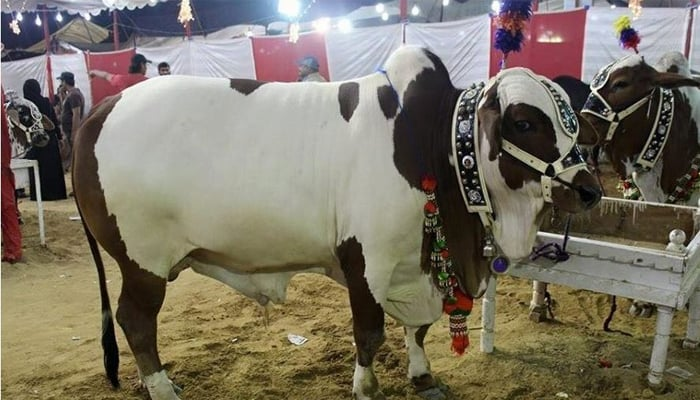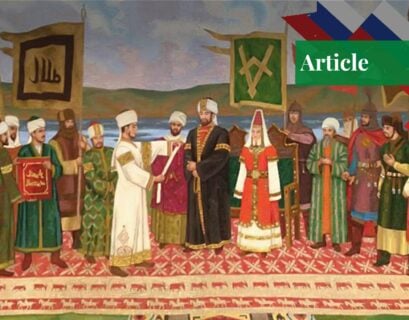Paradigm Shift is an official staff account.
Eid-ul-Adha, also known as the Feast of the Sacrifice, is the 2nd major Islamic festival that is celebrated by Muslims as per the Islamic lunar calendar. This joyous occasion brings together Muslims from around the world to commemorate Prophet Ibrahim’s (P.B.U.H) unwavering faith and obedience to Allah. Through acts of sacrifice and devotion, Eid-ul-Adha serves as a reminder of the values of faith, sacrifice, and unity that lie at the heart of this sacred festival.
In Pakistan and India, this festival is one of the most celebrated. The subcontinent is home to diverse cultures and ethnicities, with Hindus and Muslims forming the majority among the various religions. It is adorned with sacred sites, including the Shah Jahan mosque and the Golden Temple, one of the greatest Hindu temples. Gurdwara Panja Sahib is also a significant place of worship in the region.
When is Eid-ul-Adha in 2023?
Eid-ul-Adha occurs on the 10th day of the Islamic lunar calendar’s final month, known as Dhu-al-Hijjah. The exact day of celebration is determined by the sighting of the moon following the completion of the obligatory Hajj pilgrimage, which is one of the five pillars of Islam and a religious duty for eligible Muslims.
The Origin of Eid-ul-Adha
The origin of this festival can be traced back to the time of Prophet Ibrahim (P.B.U.H). Prophet Ibrahim (P.B.U.H) was known for his obedience to Allah and his willingness to sacrifice anything for Allah (SWT). One day, Allah (SWT) commanded the prophet in his dream to sacrifice his only son, Prophet Ismail (P.B.U.H). Prophet Ibrahim (P.B.U.H) knew it was a command from Allah, so he started preparing to sacrifice his beloved son for Allah (SWT).
Satan tried to discourage Prophet Ibrahim (P.B.U.H) from carrying out the order of Allah, but Prophet Ibrahim (P.B.U.H) threw stones at Satan to get rid of him. Before initiating the sacrifice, he blindfolded himself to fulfil the command. Allah (SWT), moved by his unwavering devotion, intervened and replaced Prophet Ismail (P.B.U.H) with a sheep. This act of divine intervention and substitution became a pivotal moment, symbolizing the ultimate act of submission and the mercy of Allah (SWT).

Eid-ul-Adha, which translates to “the feast of sacrifice,” serves as a commemoration of this remarkable event. Muslims view Prophet Ibrahim’s willingness to sacrifice his son as an exemplary act of devotion and submission to Allah’s will. It serves as a reminder to Muslims of the importance of surrendering their desires and following Allah’s commands with unwavering faith.
During Eid-ul-Adha, Muslims around the world perform Qurbani, which involves sacrificing a permissible animal, such as a sheep, goat, cow, or camel, following specific guidelines and rituals. The sacrifice is carried out as an act of gratitude to Allah for His blessings and a demonstration of obedience to His commands.
Rules of Qurbani
The rules of Qurbani are straightforward. The animal to be sacrificed must be in good health and without any defects. Sheep and goats should be at least one year old, while camels and cows must be at least two years old. The slaughter of the animal must be made in the name of God.
Following the sacrifice, the meat should be divided into three portions: one for the person performing the sacrifice, one for the poor, and one for relatives and friends. Qurbani is a voluntary act of worship, but it is highly recommended for Muslims who are financially capable.
In addition to these rules, there are some further guidelines to keep in mind. The animal should be slaughtered in a humane manner, ensuring a quick and painless process. The distribution of the meat should be done promptly so that it reaches those in need in a timely manner. When cooking and consuming meat, proper hygiene should be maintained.
A Tradition of Celebrating Eid-ul-Adha
Families often begin the day by attending the special Eid prayers at the mosque or designated prayer grounds. After the prayers, they embrace each other with heartfelt wishes of “Eid Mubarak” (Blessed Eid) and exchange gifts, known as “Eidi,”, particularly among children.
The celebratory atmosphere continues with elaborate feasts that feature traditional dishes and delicacies. Special dishes, often prepared with the meat from the sacrificial animal, take centre stage on the dining table, symbolizing the spirit of sacrifice and sharing.
Many individuals extend their generosity by donating to charitable causes and providing food, clothing, and other essentials to those in need. This act of kindness and compassion embodies the true spirit of Eid-ul-Adha, reminding us of the importance of empathy and selflessness.
How Eid-ul-Adha is Celebrated in Pakistan
Eid-ul-Adha in Pakistan, also known as “Bakra Eid” or “Bari Eid,” is celebrated with immense enthusiasm and joy. The government and individuals set up designated areas across the country for buying and selling sacrificial animals. These locations also serve as showcases for the animals’ beauty and uniqueness. People adorn their animals with mouth halters and flower garlands to proudly display their animals’ attractive appearance.
This festive occasion creates new business opportunities, with the sale of animal feed and various accessories for the care of sacrificial animals. Those who are eligible to perform the sacrifice acquire their animals 15-20 days before Eid and diligently care for them. As Eid approaches, they develop a deep affection for their animals, which is why you often witness tearful faces during the Eid festivities.
Celebration of Eid in India and Other Parts of the World
In India, the celebration of Eid is similar to that in Pakistan. However, due to the majority Hindu population and the cow being considered a sacred animal in Hinduism, cow sacrifice is not practised widely. However, it is important to note that in certain states of India, cow sacrifice does occur.

In many other parts of the world, governments provide facilities for individuals to perform animal sacrifice and distribute the meat into three portions. Similar services are also available in Pakistan and India, but many individuals prefer to carry out the sacrifice themselves.
Conclusion
Eid-ul-Adha is a significant Islamic festival that symbolizes faith, sacrifice, and unity. Muslims worldwide come together to honour Prophet Ibrahim’s unwavering devotion and perform acts of gratitude and obedience to Allah. The festival includes special prayers, gift exchanges, and feasting on traditional dishes. It also emphasizes the importance of giving back to the community. Eid-ul-Adha unites Muslims in celebrating their faith and embracing compassion and generosity.
If you want to submit your articles, research papers, and book reviews, please check the Submissions page.
The views and opinions expressed in this article/paper are the author’s own and do not necessarily reflect the editorial position of Paradigm Shift.





















